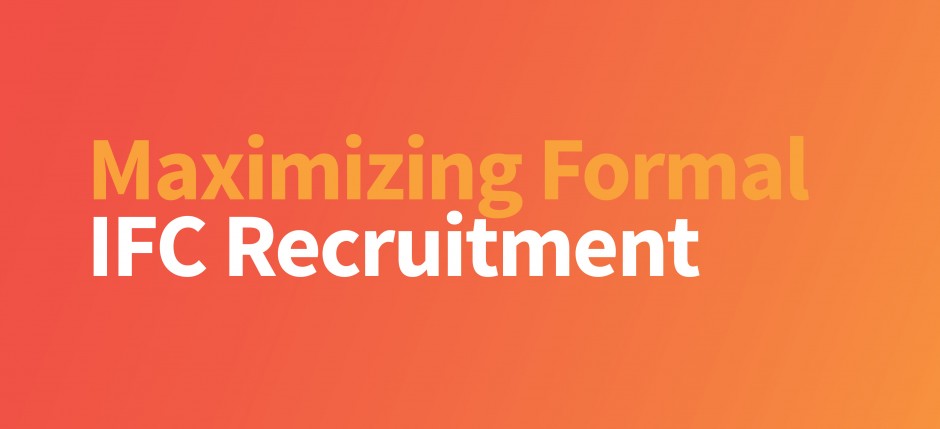Maximizing Formal IFC Recruitment
by Matt Farrell
Have you found yourself asking: is formal fraternity recruitment the answer, or the problem?
You’re not alone if your interfraternity council is asking this. At Phired Up, we see countless campuses debating this question across our national travels. It’s easy to poke holes in both sides of the question.
This makes the Washington State IFC so interesting. Like many other large state schools, they see hundreds of potential new members express interest in fraternity before arriving, and chapters that want access to all of them. It’s a logistical nightmare that can take the fun out of recruitment no matter what the structure looks like.
So from an outsider’s’ perspective, WSU has moved past the above question to a more advanced one: “How can we make the recruitment experience as enjoyable and efficient as possible, so every PNM benefits?”
The result of this question is the creation of one of the most advanced recruitment counselor programs we’ve seen for any IFC, known locally as the Rho Chi experience. Phired Up is fortunate to facilitate the multi-day training, but the IFC’s vision to build it came first.
So, what is the Rho Chi experience and what makes it special? We talked to a couple students while preparing for this year’s training so you can hear straight from the source.
An Investment in First Impressions
“So many guys sign up for recruitment having no idea what fraternity really is,” says Julian Naranjo, IFC Executive VP and Sigma Phi Epsilon brother who coordinates the program. “They may never find out if we don’t introduce it properly. We need to showcase the leadership and mentorship opportunities available to them right from the beginning.”
“We want to ensure PNMs don’t fall through the cracks,” adds IFC President and Tau Kappa Epsilon brother Austin Proteau. “Formal recruitment is not for everyone and we don’t want to hurt people’s chances of joining if they don’t perform well with a large group. Smaller groups lead by competent Rho Chis help address this.”
Seasoned Rho Chi and SigEp Andrew Thomas describes first impressions even more bluntly. “Many people are hell-bent on the idea that the guys who sign up for formal recruitment base their decision off poor stereotypes seen in movies. While I think they have a point, there’s plenty of men that don’t adhere to the stereotype. Both types are going to find a way in front of chapters regardless, so you can’t blame formal recruitment for that. A positive Rho Chi experience gives us a chance to fuel the fire the right way.”
So how does the Rho Chi Experience get built?
Investing in Training, Not Just Talent
“This isn’t a position we recruit purely off natural ability,” says Proteau. “We don’t want Rho Chis teaching PNMs to state their values to chapters, since this is awkward in conversation. We rely on training them to build out their stories instead of saying their values. This is an area we spent most of our time with Phired Up on last year. Now we’re ready to spend more of that time on situationals. Tangible skills. How to do the job, challenges, things you run into that you need to prepare for.”
Naranjo adds that many PNMs definition of a great Rho Chi is “actually terrible” once they get an advanced perspective.
“It’s not just about being a cool guy which maybe is all PNMs are looking for at the time. We want men who are easy to get along with, but also people who PNMs feel comfortable around and who are okay with being brutally honest. If PNMs don’t hear it from their Rho Chi, they may not hear it straight from anyone else.”
Phired Up and the IFC are preparing a further developed training on handling tough questions for this fall, to ensure they are being answered in ways that are both 100% true and 100% validating. We’ve noticed that many of PNMs questions are only answered through one of the above, at best.
Creating Points of Pride
If you were to spend a couple days around this program as we have, it would be evident that it goes far beyond a mere recruitment counselor checklist. Rho Chis all get visors that further symbolize their role as a coach instead of a babysitter. The men have become friends across chapters and see it as a way to develop future IFC leaders (Naranjo was a Rho Chi last year).
“The whole point of being a Rho Chi is to be both a leadership figure and friend to PNMs. If you’re good at both, you’ll have a significant impact on them and how they perceive Greek Life based on their relationship with you. I think it will compound over the next few years and slowly eradicate lots of negative stereotypes for us,” adds Thomas. “We know that guys will follow and repeat the behavior they see, because for a lot of them the Rho Chis are the first fraternity men they knowingly meet.”
Naranjo’s words bring home the full mission of Rho Chis.
“This is about creating a platform for very young individuals at our university. Before some of them even take a class, we want to give them leaders and someone they can look up to.”
Contact farrell@phiredup.com to learn more about building a similar program on your campus.

